

Isaac
Music ed isn’t a luxury. All of our children should be learning music. Learning music can increase thinking skills, enrich strategies for learning and creativity, and enhance connections across subjects.
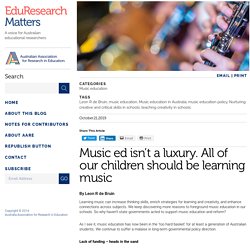
We keep discovering more reasons to foreground music education in our schools. So why haven’t state governments acted to support music education and reform? Hallam The power of music. Critical Thinking and Music Education. 2256 Onur Topoğlu / Procedia - Social and Behavioral Sciences 116 ( 2014 ) 2252 – 2256 Like many other domains, music is not one-dimensional.
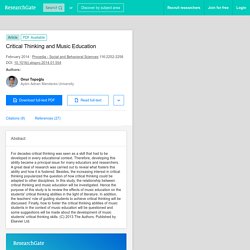
It entails perceptual skills (e.g., apprehending structural information as well as social information), cognitive skills (e.g., memory, decision making, pattern recognition) as well as motor skills. These skills function, interact, and evolve in such complex ways that we are slowly starting to. How Music Class Participation Can Spark Brain Development. EVANSTON, Ill. – Music training has well-known benefits for the developing brain, especially for at-risk children.
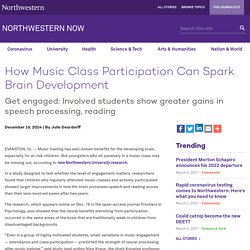
But youngsters who sit passively in a music class may be missing out, according to new Northwestern University research. In a study designed to test whether the level of engagement matters, researchers found that children who regularly attended music classes and actively participated showed larger improvements in how the brain processes speech and reading scores than their less-involved peers after two years. The research, which appears online on Dec. 16 in the open-access journal Frontiers in Psychology, also showed that the neural benefits stemming from participation occurred in the same areas of the brain that are traditionally weak in children from disadvantaged backgrounds.
The type of music class may also be important, the researchers found. “Music, then, can’t be thought of as a quick fix,” said Kraus. Anita Collins: The benefits of music education. Music education helps improve children's ability to learn - Dr Anita Collins - ABC Education - What if a large number of scientific studies found there was one activity that could improve our cognitive function, help our memory systems work effectively, help us learn language, help us moderate our emotional states, help us solve complex problems and help our brains be healthier into later life?
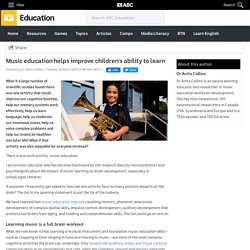
What if that activity was also enjoyable for everyone involved? There is one such activity: music education. I am a music educator who has become fascinated by the research done by neuroscientists and psychologists about the impact of music learning on brain development, especially in school-aged children. Anita Collins Music. Dr Anita Collins is an award-winning educator, researcher and writer in the field of brain development and music learning.

She is internationally recognized for her unique work in translating the scientific research of neuroscientists and psychologists to the everyday parent, teacher and student. Since 2016, Anita has travelled around the world to interview over 100 neuroscientists and psychologists about music learning and brain development, known as neuromusical research. Anita now uses the research to present, consult and advocate for an updated understanding of how music learning can benefit every child’s development. Anita’s work first came to prominence when she wrote the script for the highly successful TEDEd video, How playing an instrument benefits your brain, followed by her TEDx Talk, What if every child had music education from birth? Music Teachers Association of South Australia (MTASA) — EducationHQ. Music programs in schools. Why learning a language is like learning a musical instrument. Why is Music Education in Schools Important? - The Inspired Classroom.
#2) Music is a way to connect with other people Music education is also important because it will give students a way to connect with other people.
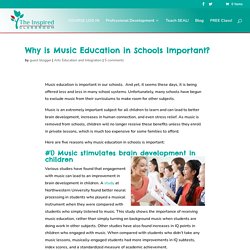
Children are naturally very social, and it’s important to encourage them to build relationships by providing them experiences to share with each other. No proof music lessons make children any smarter. Music is one of the most beautiful and powerful creations of humankind, and its powers are well known – making us happy and sad or relaxed and excited.
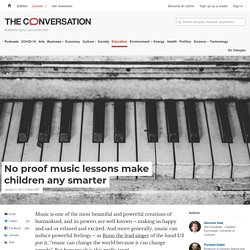
And more generally, music can induce powerful feelings – as Bono the lead singer of the band U2 put it, “music can change the world because it can change people”. But how much is this really true? We often assume that encouraging a child to play a musical instrument or to listen to certain types of music will have a wider impact on more than just their musical taste. Learning Music Can Help Critical Thinking. Quite apart from the merits of teaching music for its own sake, there is a view being increasingly voiced among education researchers that music can be used to promote critical thinking in children.

This was a topic that surfaced in the 1990s, with the view that asking questions about music can stimulate a deeper understanding of art and communication than just learning the external facts. Well it has come up again. No doubt this has been prompted by a growing recognition that learning music in the school classroom or in private lessons can all too easily become narrow in its focus, concentrating on performance outcomes rather than thinking. And it comes hand-in-hand with a long-held view that music is a practical activity that lies outside core school subjects that do depend on critical thinking.
Yet at the same time, and quite paradoxically, there is also now the popularly-held view, albeit unproven, that music lessons can make a child smarter. The Impact of the Use of Inquiry-Based Learning as a Teaching Methodology on the Development of Critical Thinking. In 1992, the University of Hawaii at Manoa School of Nursing adopted inquiry-based learning (IBL) as a teaching methodology.
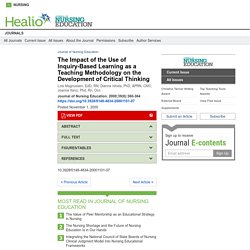
The development of IBL resulted from faculty's exposure to the National League of Nursing's curriculum revolution (NLN, 1989), as well as a study of problem-based learning tutorials developed by Barrows and Tamblyn (1980). IBL is designed to increase student involvement in their learning. Since its effect on students' critical thinking had not been tested, the purpose of this study was to determine if IBL as a teaching methodology enhances critical-thinking ability as measured by the Watson Glaser Critical Thinking Appraisal. Although many would contend that problem-based learning (PBL) began with Socrates and has continued throughout the history of medical education in the form of bedside clinical teaching, PBL formally originated at McMaster University School of Medicine in Ontario, Canada in the late 1960s.
Table.